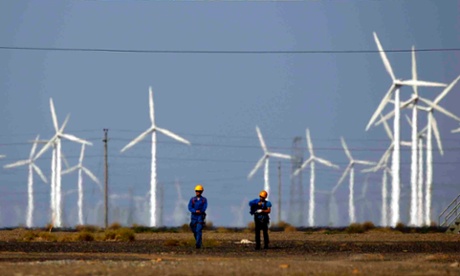The world’s leading energy economist has warned against investing in large new oil and gas developments, which would have little impact on the current energy crisis and soaring fuel prices but spell devastation to the planet.
Fatih Birol, the executive director of the International Energy Agency (IEA), was responding to an investigation in the Guardian that revealed fossil fuel companies were planning huge “carbon bomb” projects that would drive climate catastrophe.
He said countries must seek to replace Russian oil and gas in the near term without damaging their long-term prospects.
“I understand some countries may look at new fossil fuels but they should remember it takes many years to start production,” he said. “[Such projects] are not the solution to our urgent energy security needs and they will lock in fossil fuel use.”
Revelations by the Guardian show nearly 200 carbon bomb projects are in planning, or have already started pumping, that will each result in at least 1bn tonnes of carbon dioxide emissions over their lifetimes, equivalent to about 18 years of current global emissions.
Companies pursuing such developments could end up with uneconomic stranded assets, Birol warned. “If the world is to succeed in moving to net zero, these projects may fail to recover their upfront development costs,” he said in an interview with the Guaridan.
Soaring global energy prices have led governments to seek new sources of fossil fuels. “I do understand why countries are reacting like this,” he said. “But there is the issue of the time horizon.”
Big new exploratory projects for oil, gas and coal would take years to produce any fuel and could lock in high greenhouse gas emissions for decades, Birol warned.
“The most suitable projects are those with short lead times and quick payback periods, such as expanding production from existing fields,” he said.
Using existing sources more efficiently would also help reduce emissions, Birol noted.
He said governments must also urgently seek to reduce fossil fuel demand, through home insulation, cutting speed limits, making public transport cheap or free and introducing car-free days in cities.
“If we do not have these voluntary measures, I’m afraid that energy rationing may be on the table,” he said.
Birol said unlike in previous oil shocks, such as those of the 1970s, the world now had cheap alternatives available in the form of solar and wind power, which had plummeted in price. This should prompt governments and companies to push harder for renewable energy.
“I believe we have the chance to make this a historic turning point to a cleaner and more secure energy system,” he said. “This is the first time I have seen such momentum behind the change to clean energy.
“The world does not need to choose between solving the energy crisis and climate crisis, we can do both.”
The UN secretary general also called for an end to new fossil fuel projects, warning that climate change posed “an existential threat to us all – to the whole world”.
Speaking at a press conference on Wednesday, António Guterres said: “Main emitters must drastically cut emissions, starting now. This means accelerating the end of our fossil fuel addiction and speeding up the deployment of clean renewable energy.”
The IEA advised almost exactly a year ago that no new gas, oil or coal development could take place from this year onwards if the world was to limit global heating to 1.5C. That finding caused shockwaves among governments in the run-up to the UN Cop26 climate summit in Glasgow in November, where leaders agreed to bring forward national plans in line with the 1.5C limit.
But many countries, and private sector companies, have ignored the advice, as the Guardian’s investigation of fossil fuel projects under development has shown. These carbon bombs would in effect eliminate any hope of staying within the 1.5C threshold.
Greg Muttitt, an energy expert at the International Institute for Sustainable Development, said: “Governments and companies often suffer from a form of cognitive dissonance: while recognising the urgency and severity of the climate threat, they still keep developing new oil, gas and coalfields and mines that will worsen the problem. The policy answer is a simple one: when in a hole, you need to stop digging.”
Greenpeace said the Guardian’s investigation revealed the “fossil fuel industry’s business model remains a blueprint for climate catastrophe”.
“Investment plans by oil and gas firms will blow us past every assessment of what is safe for the climate, and that’s shocking,” said the group’s senior climate adviser Charlie Kronick.
“But what’s truly shocking is that they are not hiding it. These activities are legal and in fact are encouraged by governments around the world, particularly the ones that have the biggest reserves and the most to lose.”
Caroline Lucas, an MP for the UK’s Green party, said in response to the Guardian’s investigation: “Governments seem intent on sending us towards our own destruction. How many more times must we tell fossil fuel companies to #keepitintheground?”
Ed Miliband, the shadow climate change and net zero secretary, said: “The answer to a global fossil fuel crisis cannot be to double down on fossil fuels. Every country must go further to rapidly accelerate the transition to clean energy.
“That’s the right response to the climate crisis, but it’s also the right response to the cost of living and energy security crises too – with renewables now by far the cheapest and most secure form of energy.
“Governments around the world should be urgently investing in a green energy sprint to shift decisively off destructive, expensive, and volatile fossil fuels for good.”













